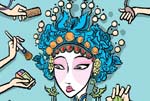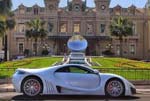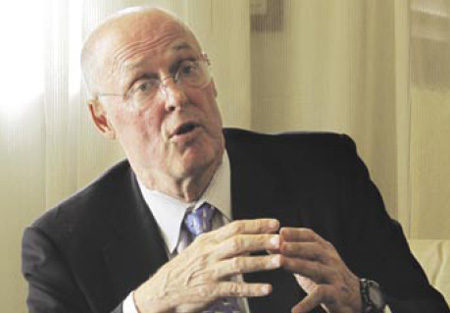Top News
Expert backs China model
Updated: 2011-04-18 10:52
By Li Xing (China Daily)
|
Former US treasury secretary Henry Paulson says currency is not the biggest factor in the US trade deficit with China. [Li Xing/China Daily] |
BOAO, Hainan - Economies of the United States and China are so intertwined that one's healthy economic growth will benefit the other.
"Our (US) economic problems are our own making, and we have to solve them ourselves. It would be easier to solve if there is strong growing Chinese economy," said Henry Paulson, the former US treasury secretary, during a news conference at the Boao Forum for Asia.
He said China would benefit from a strong US economy.
He also gave caution to "those who wish for problems in China". "If China has problems, our problems would be more difficult," he said.
He said currency is not the biggest factor in the US trade deficit with China. Nor does he believe imports from China are costing jobs in the US.
"If we didn't import from China, we'd import from somewhere else," he said, adding that Chinese imports help increase the choices for Americans and "keep inflation down".
There is a divergent view over the outlook of China's economy. Pessimists arouse fear that China is plagued with various bubbles and that its economy will crash and drag the global economy down with it. Optimists say that there is little to worry about China's growth.
Though "optimistic about the outlook of the Chinese economy", Paulson said it doesn't mean there aren't any problems with the Chinese economy.
Recalling the period leading up to the financial crisis in 2008, he said the US and several other advanced countries saw significant debt in the percentage of GDP increase.
In China, "it was countercyclical" with debt decreasing. That is why "it gave (Chinese) policymakers the flexibility to have a very aggressive stimulus plan, bank lending, without imperiling the banking system," Paulson said.
"It was necessary and very good for China and for the world," he said, but the program is not "without having some untoward side effects", such as bad loans and bubbles.
It is also considered as the main cause for inflation. China's inflation index climbed to a 32-month high in March, registering a rise of 5.4 percent year-on-year.
"I think good news here is that it (the problem) is recognized, and the government is focusing on it," he said.
A lot of economists have prescribed appreciating the renminbi as a measure to curb inflation. Paulson, on the other hand, sees an increasingly flexible renminbi as more than a tool to combat inflation in the country.
"I look at it as a proxy for reform," he said. "I think when the currency sends a market price signal, it is going to be much easier to transform your economy toward a different growth model, to allocate capital more efficiently."
As the second largest economy in the world, China has integrated itself more and more into the global economy in trade and services. "I have always believed that it is in China's best interest to move as quickly as possible to a currency that is market determined," Paulson said.
He said there is broad consensus on the need for China to reform its renminbi exchange rate, though he added that "China is on the path" to doing so. The differences lie in pace and timing.
"What they want is stability and growth, which is the same thing that I want and, I think, the whole world wants," he said.
Moreover, China still has to put into effect the economic transformation it has spelled out in its 12th Five-Year Plan (2011-2015).
"It is difficult to make a comprehensive plan. It is even more difficult to implement the plan," he said. "I believe that the challenge before China is one of evolution, evolving to an economy where there is more innovation, higher value added products, less reliance on exports, more on domestic consumption."
This will also be an evolution toward an economy "where the prosperity is shared more broadly an alternative growth model based on greater energy efficiency, new sources of alternative energy", he said.
"One of the challenges is the fact that China is a hybrid economy. It is evolving every day toward reliance on more and more market mechanisms; it also relies on administrative measures," he said. "This model has served very well. But it is increasingly difficult to manage an economy unless the pace of reform in opening-up actually accelerates. I know China is very committed to reform and opening-up."
China Daily
Specials

Peking Opera revival
Traditional opera is enjoying a revival in Beijing thanks to some modern touches.

25 years after Chernobyl
Belarus, Ukraine and Russia will mark the 25th anniversary of the nuclear reactor explosion in Chernobyl.

Luxury car show
The world's most prestigious luxury, sports cars and supercars are displayed in Monaco.
